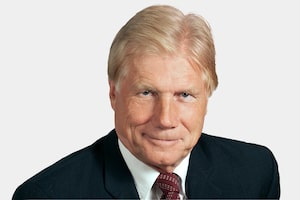With the William and Kate show soon to begin, an Associated Press reporter was asking about Stephen Harper's evident affinity for the monarchy. He wondered if the Prime Minister sees the monarchy as a cornerstone of the Canadian identity.
Mr. Harper comes across as the biggest supporter of our sovereigns since John George Diefenbaker. He glowed during the Queen's visit last summer. Under his stewardship, there has been no controversy over the monarchy's future, no talk of one day breaking the final bonds with Britain. Jean Chrétien enjoyed a warm relationship with the Queen, but was ambivalent about the royal ties, a view which represented a wide swath of public opinion. Liberals like John Manley and Ken Dryden wanted to wave the monarchy goodbye as a final act in Canada's growing up.
For Mr. Harper, the monarchy fits nicely with his old-fashioned sense of Canada. He is a prime minister who accentuates traditional symbols such as the North, the sport of hockey, the military. He is big on family values, the church, and straight, clean living. Full of conservative touchstones, it's a portrait that harkens back to the 1950s, one that has a good deal of appeal, especially to the older demographic.
With the sparkling newlyweds, the monarchy could well be undergoing a repopularization in Canada and elsewhere. This will play well to the sentiments of the Prime Minister, who will undoubtedly be giving the Duke and Duchess a resplendent welcome on their eight-city tour, which will be watched by the international media.
Mr. Harper cherishes both our historic big-power allies, Britain and the United States, and with his majority will work to enhance ties with them. For growing the American relationship, he has been met, until now, with bad timing. Widespread disdain for the presidency of George W. Bush made progress difficult. The PM had to keep his distance, especially having supported the Iraq war. Mr. Chrétien's bold and popular decision to stay out of that conflict required that the Liberal leader go up against both Britain and the U.S.
Under Barack Obama, who inherited the Bush recession, Ottawa has been seeking - though the Conservatives were slow off the mark in doing it - other markets. Our relationship with the U.S. has taken on a unique look. Foreign policy under Mr. Harper has shifted so much that it is now to the right of Washington's. It's hard to recall another period in our history where this has happened. Traditionally, Ottawa has favoured a nuanced approach, one that has won wide respect in foreign councils. In the past five years, it has given way to the arrogance of ideological certitude.
But as he sets course with his increased political capital, the PM can deepen the bonds with the U.S. The proposed perimeter accord could well be a deal of lasting significance, building on the commercial partnership of the free trade agreements and the defence partnership of NORAD.
Canada could certainly benefit from a pact that eases the post-9/11 barricading of the border, which has rightly been criticized by the Harper team. What is not needed is an umbrella agreement that would allow the Americans, still paranoid about security 10 years after 9/11, to extend draconian restrictions on liberties to this country in the wake of, say, another terrorist hit. We don't know if such fears are justified because the perimeter negotiations are proceeding with customary Harperian secrecy, the latest example being the duplicity, as reported by the Auditor-General, in the G8 summit spending.
There is little doubt a perimeter agreement will be reached. Opponents will raise a storm about sovereignty being breached, but the nationalist community in this country is one whose clout has significantly diminished. Overcoming his old reputation as a regionalist, Mr. Harper has played the patriot card, which serves him well in countering such fears. His rhetoric is filled with stand-up-for-Canada bravado and salutes to the country's greatness.
While nurturing the ancestral alliances, he's trying to give the country a strong conservative sense of itself. A big blue Canadian id.
 Lawrence Martin
Lawrence Martin